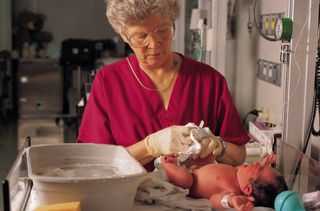

The key to tax breaks for your child is a Social Security number, says Kiplinger. Its recent article, "The Most-Overlooked Tax Breaks for New Parents," shares some great opportunities to cut your tax bill as your family grows.
You'll need an SSN to claim your new baby as a dependent on your tax return. If you don't report the number, it can mean a $50 fine and tie up your refund. Request a Social Security number for your newborn at the hospital when you apply for a birth certificate.
Dependency Exemption. Claiming your son or daughter as a dependent will shelter $4,000 of your income from taxes in 2015, which will save you $1,000 if you are in the 25% bracket. You will receive the full year's exemption, no matter when the child was born or adopted during the year.
Child Tax Credit. A new baby also gets you a $1,000 child tax credit every year until your dependent son or daughter turns 17, no matter when the child was born during the year. Unlike an exemption that reduces the amount of income the government gets to tax, a credit reduces your tax bill dollar for dollar. So, the $1,000 child credit will reduce your tax bill by $1,000.
Increase Your Take-Home Pay. When you claim another dependent, you will cut your tax bill. So decrease your tax withholding from your paychecks with a new W-4 form.
Head of Household Filing Status. If you're single, having a child may allow you to file as a head of household rather than as a single, which enables you to get a bigger standard deduction and more advantageous tax brackets. To qualify as a head of household, you must pay more than half the cost of providing a home for a qualifying person like your new child.
Earned Income Credit. Having a child pushes the cutoff to claim this credit which offsets federal payroll and income taxes for low- and moderate-income workers to $44,650 for 2015 returns. The income cutoff is higher if you have two or more children.
Child-Care Credit. If you pay for child care to allow you to work, and that income is taxed, you can earn a credit if you're paying for the care of children under 13. The size of your credit depends on how much you pay for care and your income.
Kid IRAs. This can be a relatively small investment when a child is young that can really grow over many decades. But you can't just open an IRA for your newborn and start throwing in cash: a person has to have earned income from a job or self-employment to have an IRA (gifts and investment income don't count). As such, you probably can't open an IRA for your newborn (unless he or she gets paid as an infant model!). But as soon as your kid starts earning some money—whether by babysitting or delivering papers or the modeling gig—he or she can open an IRA. Remember that although a child must have earned income to have an IRA, his or her own money doesn't have to go into the account. Parents or grandparents can give the child money for the IRA, limited to the lesser of $5,500 a year or 100% of the child's earnings.
Reference: Kiplinger (February 2016) "The Most-Overlooked Tax Breaks for New Parents"


